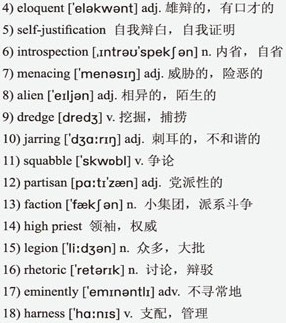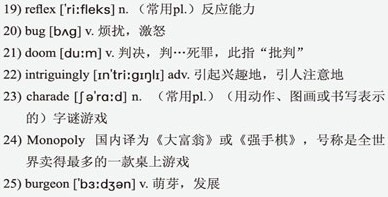Seeking further perspective, I interviewed a very different kind of gaming insider: Adam Martin, a lead programmer for NCE Studio, the British outpost of one of the world's largest online games developers, NCsoft. Adam has a computer science degree at Cambridge, and is currently filling his spare hours writing games on his laptop to help him master Korean—the language of a country with the most highly evolved electronic gaming culture in the world. “Computer games teach,” he tells me. “And people don't even notice they're being taught. They're having too much fun. I think the next big change will come from the use of video games in education.” But isn't the kind of learning that goes on in games rather narrow? “A large part of the addictiveness of games does come from the fact that as you play you are noticeably getting ‘better,' learning or improving your 19)reflexes, or mastering a set of challenges. But humanity's larger understanding of the world comes primarily through interaction and experimentation, through answering the question ‘what if?' Games excel at teaching this too. The thing that 20)bugs me is that how many of the people 21)dooming and glooming about children and games have bothered asking a child what they think, or why they play?”
为了进一步了解真相,我采访了一位非常与众不同的游戏界“圈内人”——亚当·马丁。他是NCE工作室的首席程序员,该工作室是世界最大的网络游戏开发商之一Ncsoft下属的英国前哨基地。亚当拥有剑桥大学的计算机科学学位,现在他的全部业余时间都用来在手提电脑上写游戏以便帮助他掌握韩语——韩国是世界上电子游戏文化发展得最好的国家之一。“电脑游戏具有教学功能,”他告诉我说,“而人们甚至没有留意到他们正在接受教育。他们更多是从中体验到乐趣。我认为下一个巨变就是电子游戏在教育中的运用。”但是,游戏里的这种教学不会非常有限吗?“大部分人玩游戏上瘾都是因为打游戏时你会明显地感觉自己在‘进步’,学习或者提高了反应能力,或者克服了一系列挑战。而人类对世界的更多理解主要是通过相互作用和试验来获得,并通过回答‘如果……将会怎么样’这类问题来实现。游戏在这个方面的教育也很擅长。让我觉得愤懑的是,那些批判孩子玩游戏,一看到孩子玩游戏就忧郁发愁的人们当中,有多少会费心问问孩子在想什么,或者他们为什么玩?”
Perhaps most 22)intriguingly, the video games industry is now growing in ways that have more in common with the old-fashioned world of 23)charades and 24)Monopoly. The games that have been shifting most units in the last two years belong to a 25)burgeoning new genre known as “social-casual”: games in which friends and relations gather round a 26)console to compete at activities that range from playing notes on a fake electric guitar (Guitar Hero) to singing karaoke and swapping videos of their performances (SingStar), or playing tennis with motion-sensitive controllers (Wii Sports). The agenda is increasingly being set by the concerns of mainstream consumers—what they consider acceptable for their children, what they want to play at parties and across generations. 也许最引人注意的是,游戏产业现在的发展趋势与老式的字谜游戏和《大富翁》游戏的发展有着共同之处。过去两年来,大批游戏玩家们趋向于一种正在兴起的新类别游戏——“社交休闲游戏”:亲朋好友们可以聚在游戏机前一起玩乐,游戏内容多样,有在虚拟电子吉他上演奏音乐(《吉他英雄》)、唱卡拉OK并交换各自的表演视频(《歌星》),或者拿着体感游戏手柄打网球(《Wii运动》)。游戏商日益重视主流消费人群的关注点——哪些是他们可以接受并允许孩子玩的,以及哪些是他们希望能在聚会时几代人一起玩的。
也许最引人注意的是,游戏产业现在的发展趋势与老式的字谜游戏和《大富翁》游戏的发展有着共同之处。过去两年来,大批游戏玩家们趋向于一种正在兴起的新类别游戏——“社交休闲游戏”:亲朋好友们可以聚在游戏机前一起玩乐,游戏内容多样,有在虚拟电子吉他上演奏音乐(《吉他英雄》)、唱卡拉OK并交换各自的表演视频(《歌星》),或者拿着体感游戏手柄打网球(《Wii运动》)。游戏商日益重视主流消费人群的关注点——哪些是他们可以接受并允许孩子玩的,以及哪些是他们希望能在聚会时几代人一起玩的。
These trends embody a familiar but important truth: games are human products, and lie within our control. In addition, games have begun to defy some of the accusations traditionally 27)flung at them by 28)custodians of the higher arts: that they cannot move you deeply, or expose you to the moral 29)frissons and complexities of a great narrative. To explore the growing field of those games that set out to do exactly these things, I talked to Justin Villiers, a scriptwriter and director who six months ago moved from the world of television and film to that of video games. “Video game titles are becoming increasingly sophisticated,” he told me. “They need to match voices and dialogue with new, more realistic graphics. Games match films for scale of production. Hundreds of people work on the big ones. And there is now a real desire to craft stories with genuine 30)arcs, to develop complex characters and to craft whole and believable worlds. There are already games out there you could describe as art. Still, in narrative terms, much of the games market is still 31)saturated with terrible stuff, which is partly why the industry is welcoming dedicated writers, directors and artists.”
这些趋势体现了一个常见而重要的事实:游戏是人类的创造物,而且处于我们的掌控之中。此外,游戏已经开始反击高雅艺术拥护者们一直以来对它的一些指责:他们认为游戏无法深刻地打动人心,或者说无法给人带来精神上的震撼,无法展开错综复杂的精彩故事。为了探寻那些正朝着这些方面努力发展的游戏领域,我采访了贾斯汀·威勒斯,他是一名编剧和导演,六个月前从影视业转行到游戏业。“电子游戏的字幕正在变得越来越讲究,”他告诉我说,“它们需要新的、更加真实的画面来配上声音和对话。从制作规模上来说,游戏与电影相当。大型游戏通常需要数百人通力合作。现在玩家对于精妙的故事情节、复杂的人物以及精心打造的整个逼真的‘场景’有着真切的需求。目前已经出现了一些足以让你称之为‘艺术’的游戏。不过,在故事情节方面,现在的游戏市场仍然充斥着许多垃圾,这也是为什么游戏业现在欢迎专业编剧、导演和艺术家进入的原因之一。”
And most research suggests that even pre-teens are not in the habit of blurring game and real worlds. This finding 32)chimes with an obvious truth: that a large proportion of “problem behaviors” in relation to any medium or substance exist for resolutely old-fashioned reasons—lack of education, parental attention, security, support and experience.
大部分研究显示,即使是十三岁以下的儿童也不会混淆游戏与现实世界。这一发现再次证明了一个显而易见的事实:那些人们常常归咎于某一媒介或物质的“问题行为”,其实大部分还是源于非常“老旧”的原因——缺乏教育、父母的关心不够、缺乏安全感和支持,还有,阅历不足。





